Why Kylie Minogue is pop’s most underestimated icon
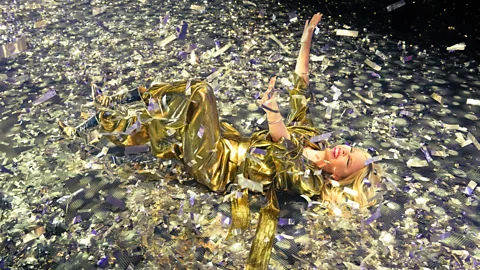 Murray Chalmers PR
Murray Chalmers PRWith the release of her 15th studio album, Disco, the Australian star is providing the ultimate escapism for tough times. Nick Levine explores her uniquely endearing appeal.
Kylie Minogue is the most charming and unassuming pop superstar of all. She’s never been as provocative as Madonna or a vocal marvel to rival Mariah Carey, but her career has proven equally fascinating and enduring. The performer who was dismissively dubbed ‘the singing budgie’ when she broke through with The Loco-Motion in the late 1980s is now a gold-plated icon whose first name alone stands for joyous dance-pop brilliance.
More like this
London’s Victoria and Albert Museum celebrated her influence on fashion in 2009 with an exhibition called Kylie Minogue: Image of a Pop Star. Madonna paid homage in 2000 by performing in a T-shirt with Minogue’s name on it. And now, a new generation of artists including Dua Lipa, Kim Petras and Alice Chater are hailing her as an influence. “She’s just such a well-rounded pop star,” Chater says. “Her songs, video and image are always incredibly well executed.”
On 6 November, Minogue released her 15th studio album, Disco, a heady collection of glittering club tracks that definitely lives up to its title. Co-written by Minogue with collaborators including Spice Girls producer Richard “Biff” Stannard and Ed Sheeran associate Fiona Bevan, it’s a sonically cohesive set that supplies a welcome blast of dancefloor escapism. At a time when her fans can't come together for a communal clubbing or concert experience, Minogue has cleverly recognised that there’s great comfort in a beloved industry stalwart – which, with more than 30 years of hits under her sequin belt, she certainly is – returning to her core values. From the funky strut of Real Groove to the campy spoken-word climax of Where Does the DJ Go?, via the cosmic shimmer of lead single Say Something and string-drenched ecstasy of I Love It, the album radiates a very Minoguean sense of pleasure and positivity. When she asks, “Would you be my dance floor darling?” on Dance Floor Darling, the answer from fans will be a hearty yes.
Where peers such as Madonna and Lady Gaga are hailed as ‘shapeshifters’ or ‘chameleons’, Minogue’s musical evolution has always been more measured. Other top-tier stars have reinvented their image by introducing a high-concept alter ego – Beyoncé’s Sasha Fierce, for example – but tellingly, Minogue’s various eras are viewed as iterations of her own reassuringly radiant persona: we've had ‘Pop Kylie’, ‘Indie Kylie’ and ‘Country Kylie’; now we're onto ‘Disco Kylie’. “Kylie moves with the times without losing her own special quality: every album is fresh yet uniquely her,” says HERR, a British drag performer who has hosted Minogue tribute nights at London LGBTQ venue The Glory. “And because she's loved across such a broad spectrum [of demographics], I don’t see her star fading any time soon.” Go to a Kylie Minogue show and you'll see pop fans from several generations rubbing shoulders with the singer's famously devoted LGBTQ fanbase.
Minogue, 52, cemented her international treasure status when she delivered a jubilant greatest-hits set in the ‘legend slot’ at last year’s Glastonbury festival. It's now the most-watched Glastonbury performance on UK TV, beating the previous record set by Sheeran. Though Minogue was noticeably younger than other recent legend slot performers including Dolly Parton, Lionel Richie and Barry Gibb, booking her wasn’t a stretch: in many territories including , and her native Australia, she ranks among her generation’s most prolific hit-makers. In the UK, where she lives and largely conducts her career, she’s racked up 34 top 10 singles including the all-time classics I Should Be So Lucky, Better the Devil You Know and Spinning Around.
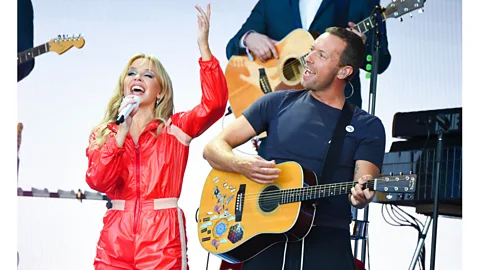 Alamy
AlamyIf Disco debuts in the top spot later this week, she’ll become the first female solo artist to score a UK number one album in five consecutive decades. Though Minogue has only ever scored two US top 10 singles – with 1988’s The Loco-Motion and 2001’s Can’t Get You Out of My Head – she’s loved by clubbers and LGBTQ pop fans. In 2018, Dancing became her 14th number one on the Billboard Dance Club Songs Chart, while 2002’s Come Into My World won her a Grammy for best dance recording.
An inauspicious beginning
Minogue’s longevity is even more remarkable considering how underestimated she was when she launched her music career in the late 1980s. Raised in suburban Melbourne, the daughter of an ant and a former ballet dancer, she first found fame by playing spunky mechanic Charlene Mitchell in Australian soap opera Neighbours. Though the cosy show was also hugely popular in the UK, Minogue wasn't afforded a superstar’s welcome when she arrived in London in October 1987 to work with the Stock Aitken Waterman songwriting and production team. Minogue's cover of Carole King’s 1960s classic The Loco-Motion had been a surprise smash in Australia and she was in the market for a follow-up smash, but the busy British trio didn't consider her a priority. Mike Stock has since itted that they “insulted” 19-year-old Minogue by making her hang around for a week, then writing what would become her next single in “about 40 minutes”.
Despite its inauspicious start, Minogue's creative partnership with Stock Aitken Waterman proved enormously fruitful. That dashed-off song, I Should Be So Lucky, made number one in the UK, and Australia, and Minogue went on to record the vast majority of her first four albums with the British trio. As their top priority, she started her UK chart career by scoring seven top two singles between 1987 and 1989 – including another version of The Loco-Motion which became a US smash. Even more impressively, she managed to inspire the self-styled ‘hit factory’ to update their increasingly formulaic sound for 1990’s superior Rhythm of Love album, which yielded the harder-edged, house-influenced hits Better the Devil You Know, What Do I Have to Do? and Shocked. Then after releasing a chart-topping greatest hits album in 1992, she parted ways with the trio for good.
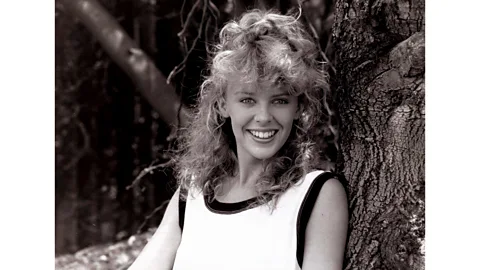 Alamy
AlamyAt this point, she signed with trendy indie label Deconstruction Records and entered her career's most experimental period. Her self-titled 1994 album embraced a more sophisticated dance-pop sound and sold respectably if not brilliantly after yielding the stunning singles Confide in Me and Put Yourself in My Place: the former offered a seductive blend of trip-hop beats and Middle Eastern strings, while the latter silenced critics with her most impressive vocal performance yet. However, 1998’s Impossible Princess LP was a trickier proposition, introducing a more introspective Minogue who wanted to explore alternative rock sounds as well as edgier electronic productions. Its Britpop-influenced lead single Some Kind of Bliss, co-written with two of Manic Street Preachers, became her first solo single to miss the UK Top 20.
Tom Aspaul, a singer-songwriter whose track Indiana was covered by Minogue (and re-titled Feels So Good) for her 2014 album Kiss Me Once, says this sometimes maligned Kylie era is key to understanding her longevity. “After half a decade at the top with Stock Aitken Waterman, she could have rested on her laurels, but instead she decided to take risks and develop massively as a performer and writer,” he argues. “I think this was absolutely crucial in setting her apart from other so-called ‘manufactured’ artists of the time.” Aspaul points out that when Minogue was ready to re-embrace pure pop music again in the late-1990s, she was able to “draw from her big early pop moments and her artistic integrity [phase]”, a potent combo which made her “unstoppable”.
And when Minogue did go pop again, so she entered her second imperial phase. After Impossible Princess became her least successful album to date, she bounced back with 1999’s camp and playful Light Years LP, home to the fizzy hits Spinning Around, On a Night Like This and Kids with Robbie Williams. Then came her career peak, 2001's Fever album, which went platinum in the US and produced modern disco perfection with the singles Love at First Sight, In Your Eyes, Come Into Your World and the era-defining Can’t Get You Out of My Head. “It was just one of those moments where the planets are aligned and everything worked – the songs, the imagery, the moment,” Minogue told the BBC recently. Chater says she can mimicking Can’t Get You Out of My Head’s distinctive dance routine in the school playground. “That was my very first Kylie memory and I can thinking everything about the song and video was just absolutely amazing," she says.
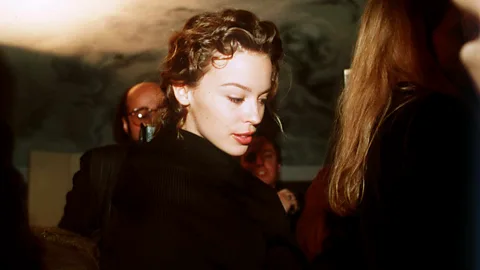 Alamy
AlamyThough the planets didn't align in quite the same way for subsequent albums – even if they came close for 2010's excellent Aphrodite LP – Minogue has never stopped producing superior club-ready confections. From 2003’s slinky Slow to this year’s sassy Magic, via 2007’s Wow, 2010’s All the Lovers and 2012’s Timebomb, she has always managed to pull a banger out of the bag. When she gave last year’s greatest hits set Step Back in Time: The Definitive Collection an atypically boastful subtitle – “pop precision since 1987” – it wasn't too much of an exaggeration. And through her career's peak and relative troughs, she's always been able to count on from her LGBTQ fans, who remained loyal even when she ditched glittery disco for earnest country-pop on 2018’s Golden album.
The Kylie magic
“It goes without saying that queer people identify most strongly with performers who face adversity, and Kylie is no stranger to that,” says HERR, alluding to Minogue’s diagnosis with breast cancer in 2005 and subsequent recovery following chemotherapy. “She’s a fighter and seeing that gives us strength. On top of that, she returns her fans’ loyalty in her continued allyship.” In 2016, Minogue was a staunch er of the successful ‘Say I Do Down Under’ campaign to introduce same-sex marriage in Australia. Her then-fiancé, actor Joshua Sasse, said the couple wouldn’t wed until everyone in Minogue’s homeland had the same rights irrespective of sexuality.
Aspaul points out that Minogue's bond with many LGBTQ fans is extremely deep-rooted. “I guess for me as a gay person of a certain generation, there's a lot of leftover sadness and bitterness from my youth, and Kylie was always an antidote to that,” he says. When singer-songwriter Rufus Wainwright picked her as one of his top 10 gay icons in 2006, he described her as “the anti-Madonna” because she offers light where her provocative peer skews darker. “Self-knowledge is a truly beautiful thing and Kylie knows herself inside out,” Wainwright said. “She is what she is and there is no attempt to make quasi-intellectual statements to substantiate it. She is the gay shorthand for joy.”
As 2019’s tremendously entertaining Glastonbury set underlined, Minogue has really blossomed as a joy-giving live performer. She now belongs in the top echelon of touring acts who can concoct and pull off spectacular stage productions like 2011’s Aphrodite: Les Folies Tour, which paid homage to Greek mythology and filled the stage with so many fountains and water jets that some fans chose to sit in a designated ‘splash zone’. Chater ed Minogue at the 2019 Brighton Pride festival and says it was “incredibly eye-opening” to watch her perform in the flesh. “I was blown away by her stage presence and how she can hold the crowd in the palm of her hand,” Chater recalls, praising the way Minogue is “sexy and elegant” at the same time. “And until you see Kylie live,” Chater adds, “I don't think you appreciate how many truly memorable songs she has. It's hit after hit after hit.”
Crucially, Minogue also possesses a somewhat nebulous but incredibly appealing quality that we don't necessarily associate with pop superstars: niceness. Her humility and natural reserve – even during her Glastonbury set's poignant moments, she refused to be fully overcome with emotion – almost undercuts the hackneyed narrative that it takes ruthless ambition to conquer the music industry. “I have never heard anyone say a single bad word about Kylie,” Aspaul says. “Everyone who's worked with her or for her, or even just met her briefly, they all love her.” He points out that Minogue is also “incredibly ive” of her peers. “Take a look at her Twitter feed – she's constantly cheering on other women, which speaks volumes,” he adds.
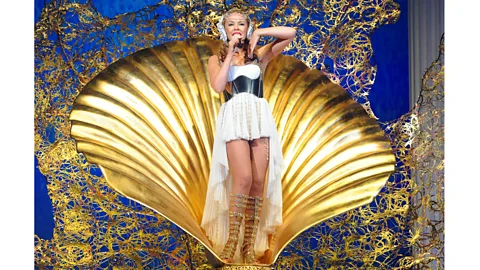 Alamy
AlamyIn a way, Minogue's niceness might partly explain why she's sometimes been underestimated. In interviews, she keeps the conversation chipper and apolitical because she's acutely aware that her purpose is to provide escapism, not social commentary: in this respect she’s comparable to her heroine Dolly Parton, another seasoned trouper who almost never lets the mask slip. If you spotted Minogue in the supermarket, you'd want to scream with excitement, but would probably stop yourself so as not to give her a shock. But at the same time, it would be a mistake to equate approachability with ordinariness. She’s lasted more than 30 years by delivering brilliant pop songs with ion and panache, and retaining a quintessentially likeable persona along the way – no mean feat in such a cutthroat industry. These days, the one-time ‘singing budgie’ is more of a resplendent pop eagle.
If you would like to comment on this story or anything else you have seen on BBC Culture, head over to our Facebook page or message us on Twitter.
And if you liked this story, sign up for the weekly bbc.com features newsletter, called The Essential List. A handpicked selection of stories from BBC Future, Culture, Worklife and Travel, delivered to your inbox every Friday.
